I recently responded to a great article by Mike Arrington over at TechCrunch: Biggest Battle Yet For Social Networks: You, Your Identity And Your Data On The Open Web (the full article is here).
My response:
This continues a trend of distributed consolidation. After all, just how many different networks can one possibly join that actually have meaning and engagement? And of them, how many times must one reenter their social graph?
This distributed world is changing in a big way and the standard bearer is data portability. Many of the big guys would rather not have it, but the momentum is forcing them to play. If they can’t beat them – then at least they’d like to be in the center of it all. A serious lands-grab is going on right now and the players include all the big guys and more than a few up-and-comers. Time will tell how it all shakes out, but it all potentially spells good news for users.
In any case, now is not the time to sit on the sidelines. Register your opinion. Be an activist. Let your service providers know what is ok and what is not. Infuence your world!
[Mr. Repetti is the CEO/CTO of RadWebTech.com and a member of the board of the International DataPortability organization (www.dataportability.org). Expressions made herein are made individually]
Sunday, November 30, 2008
Sunday, November 23, 2008
New Drag and Drop Plug-in Released for Firefox
Today, RadWebTech released the xWinLib_dnd browser plug-in for Windows and Mac-based Firefox (and Mozilla-compatible) browsers. It works in conjunction with the company’s xWinLib JavaScript library.
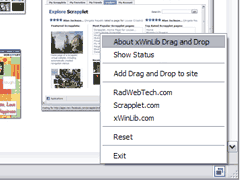 Once installed, the plug-in provides advanced drag and drop functionality for supporting web pages, including cross-domain drag and drop. Additionally, it adds a small icon to the bottom status bar of the browser with single-click access to a popup menu with a number of features.
Once installed, the plug-in provides advanced drag and drop functionality for supporting web pages, including cross-domain drag and drop. Additionally, it adds a small icon to the bottom status bar of the browser with single-click access to a popup menu with a number of features.
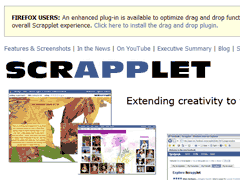 The first site to fully support the enhanced functionality is Scrapplet (www.scrapplet.com). The enhanced functionality makes it easy to mashup pages and web content with drag and drop ease.
The first site to fully support the enhanced functionality is Scrapplet (www.scrapplet.com). The enhanced functionality makes it easy to mashup pages and web content with drag and drop ease.
The plug-in also includes a feature where users can recommend advanced drag and drop adoption by sites that have not currently implemented the ease of use provided by the enhancement.
Webmasters may contact the company directly (bizdev@scrapplet.com) for information about adding the RadWebTech drag and drop functionality to their own sites.
To get the plug-in, goto http://www.scrapplet.com using Firefox. The site’s home page will detect if the plug-in has not been installed and provide an installation link to install it.
 Once installed, the plug-in provides advanced drag and drop functionality for supporting web pages, including cross-domain drag and drop. Additionally, it adds a small icon to the bottom status bar of the browser with single-click access to a popup menu with a number of features.
Once installed, the plug-in provides advanced drag and drop functionality for supporting web pages, including cross-domain drag and drop. Additionally, it adds a small icon to the bottom status bar of the browser with single-click access to a popup menu with a number of features. The first site to fully support the enhanced functionality is Scrapplet (www.scrapplet.com). The enhanced functionality makes it easy to mashup pages and web content with drag and drop ease.
The first site to fully support the enhanced functionality is Scrapplet (www.scrapplet.com). The enhanced functionality makes it easy to mashup pages and web content with drag and drop ease.The plug-in also includes a feature where users can recommend advanced drag and drop adoption by sites that have not currently implemented the ease of use provided by the enhancement.
Webmasters may contact the company directly (bizdev@scrapplet.com) for information about adding the RadWebTech drag and drop functionality to their own sites.
To get the plug-in, goto http://www.scrapplet.com using Firefox. The site’s home page will detect if the plug-in has not been installed and provide an installation link to install it.
Saturday, November 22, 2008
MashupCamp: DAY THREE
The final day of MashupCamp started as before with introductory remarks by Dave Berlind. This morphed into the second discussion panel of the conference: “Making Money with Mashups.”
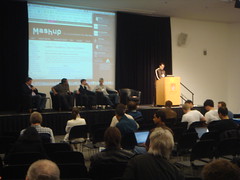 The panelists included mashup entrepreneurs Yobie Benjamin, Andres Ferrate, and Taylor McKnight combined with local valley VC, Jeff Clavier. Insightful and timely, the conversation confirmed the value of the new camp format which now includes this type of panel discussion.
The panelists included mashup entrepreneurs Yobie Benjamin, Andres Ferrate, and Taylor McKnight combined with local valley VC, Jeff Clavier. Insightful and timely, the conversation confirmed the value of the new camp format which now includes this type of panel discussion.
The rest of the day was dominated by the “Best Mashup” competitions. Many of the sponsors, including my company, RadWebTech, offered prizes for the best mashup showing off the sponsors products or technology. And, the conference itself offered a Mac Book Pro for the best overall Mashup.
One sponsor, the Elfenworks Foundation, wasn’t a solutions provider at all, rather they sought to encourage their cause through the sponsoring of a mashup contest. It was an inspired and compelling way to increase the visibility of an important issue: social justice and domestic poverty.
Contestants were split into two groups to present their works in one of two reverse speed-geeking sessions. In this format, the entrants displayed the fruit of their labors on high-top tables while the other 300+ participants went from table to table in 8-minute spurts with Dave the whistle guy blowing his woo-woo machine in between.
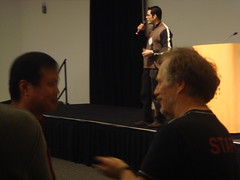 Lunch and the keynote speech from legendary Tim O’Reilly separated the two sessions. Tim fired up the crowd with his data-centric view of the world – a concept well received by the mashup community – and ended on the theme of data portability – a timely topic uniquely tied to my own efforts in the DataPortability organization.
Lunch and the keynote speech from legendary Tim O’Reilly separated the two sessions. Tim fired up the crowd with his data-centric view of the world – a concept well received by the mashup community – and ended on the theme of data portability – a timely topic uniquely tied to my own efforts in the DataPortability organization.
Through the contribution of TechWeb and the sponsors of MashupCamp, my company RadWebTech included, the entire event is provided to all attendees free of charge. Entrance into the mashup contests likewise only requires the desire to participate.
Entries ranged from story-board presentations, to commercial-grade applications, as well as mashup creations birthed from all-night programming sessions. Several were actually (or wannabe) commercial products taking advantage of the free venue to display their wares. Geeks are often socially challenged but they’re not dumb, and needless to say none of these conference trespassers won.
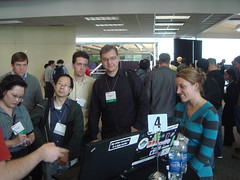 The real stars shined in the bleary eyes of exhausted mashup developers that somehow found the energy to speed-geek their creations with enthusiasm. The top entries that caught my attention included a variant on tag clouds, a compelling way to search and view videos, a plug-in that brought mashup capabilities to any web page, and several mobile-based solutions.
The real stars shined in the bleary eyes of exhausted mashup developers that somehow found the energy to speed-geek their creations with enthusiasm. The top entries that caught my attention included a variant on tag clouds, a compelling way to search and view videos, a plug-in that brought mashup capabilities to any web page, and several mobile-based solutions.
Many of the mashups demonstrated integration with wikis and other social elements, back-end data sources, and even the semantic web – all brought together through the use of tools provided by several of the solutions providers/sponsors, including: Mozenda, WetPaint, and Calais.
My company’s product, DistroMash, was used by contestants as a mashup container that was then rendered on the Scrapplet presentation platform (another of RadWebTech’s products).
After all the presentations were completed, and the final woo-woo from Dave’s horn was heard, conference participants were asked to “vote” for their favorite mashup and best solutions provider. The voting was accomplished by ignoring your mother’s warnings not to take wooden nickels. Each participant was provided an actual wooden nickel for best mashup and another for best solutions provider – and they were a highly sought currency by both contestants and providers.
After tallying the vote (counting of the nickels), the great hall hosted the final get together award ceremony and cocktail party. Dave held the stage as he went through the recognitions. The tables of beer and wine were just out of reach and teased the crowd as they were wholly off limits until the last award was presented.
Best overall mashup went to Dean Mao for his Firefox plug-in that mashed up the world. Each sponsor selected their winner and presented prizes ranging from hard drives and other equipment to cold hard cash.
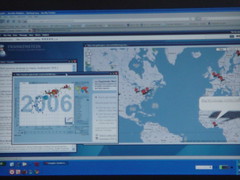 The winner of RadWebTech’s best Mashup using DistroMash was a team of interns from SAP, Martin Czuchra and Jennifer Baldwin:
The winner of RadWebTech’s best Mashup using DistroMash was a team of interns from SAP, Martin Czuchra and Jennifer Baldwin:
“We aimed to create awareness of poverty issues in a user's neighborhood by showing such elements on a map. We aggregated RSS feeds with Yahoo Pipes and also added geotagging with Yahoo Pipes. We then plotted this information on Google Maps. Finally we created the web application with DistroMash adding a feed reader, the map and a visualization from gapminder.”
Before I presented them with their brand new Playstation 3 and deluxe SOCOM (with blue-tooth headset!), I got to thank everyone for their participation and point out that the new generation, represented by these two young interns, wasn’t replacing our generation – they were expanding the world of mashups that included all generations.
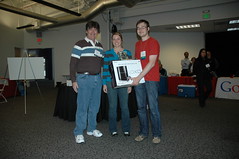 After the obligatory pictures, I asked how they were going to share their award and suggested alternating Tuesdays, Thursdays, and every other weekend joint custody.
After the obligatory pictures, I asked how they were going to share their award and suggested alternating Tuesdays, Thursdays, and every other weekend joint custody.
Finally, the recognitions and congratulations were finished and the drinking began – but not without one last twist to the Mashup theme. The good folks from Calais introduced balsa wood airplane kits to the crowd and challenged them to mash them up for a flying contest (no cash prizes this time).
Beer, geeks, and gliders. ‘nough said.
Congrats to all who attended this spectacular event, thanks to TechWeb, David Berlind, Greg, Angela, and Elizabeth, and to all of the sponsors who contributed. I can’t wait until the next one. I’ve already mashed it up on my calendar.
Click here to see all of my pics from the conference.
[this was the last in a three part series about MashupCamp, fall 2008]
 The panelists included mashup entrepreneurs Yobie Benjamin, Andres Ferrate, and Taylor McKnight combined with local valley VC, Jeff Clavier. Insightful and timely, the conversation confirmed the value of the new camp format which now includes this type of panel discussion.
The panelists included mashup entrepreneurs Yobie Benjamin, Andres Ferrate, and Taylor McKnight combined with local valley VC, Jeff Clavier. Insightful and timely, the conversation confirmed the value of the new camp format which now includes this type of panel discussion.The rest of the day was dominated by the “Best Mashup” competitions. Many of the sponsors, including my company, RadWebTech, offered prizes for the best mashup showing off the sponsors products or technology. And, the conference itself offered a Mac Book Pro for the best overall Mashup.
One sponsor, the Elfenworks Foundation, wasn’t a solutions provider at all, rather they sought to encourage their cause through the sponsoring of a mashup contest. It was an inspired and compelling way to increase the visibility of an important issue: social justice and domestic poverty.
Contestants were split into two groups to present their works in one of two reverse speed-geeking sessions. In this format, the entrants displayed the fruit of their labors on high-top tables while the other 300+ participants went from table to table in 8-minute spurts with Dave the whistle guy blowing his woo-woo machine in between.
 Lunch and the keynote speech from legendary Tim O’Reilly separated the two sessions. Tim fired up the crowd with his data-centric view of the world – a concept well received by the mashup community – and ended on the theme of data portability – a timely topic uniquely tied to my own efforts in the DataPortability organization.
Lunch and the keynote speech from legendary Tim O’Reilly separated the two sessions. Tim fired up the crowd with his data-centric view of the world – a concept well received by the mashup community – and ended on the theme of data portability – a timely topic uniquely tied to my own efforts in the DataPortability organization.Through the contribution of TechWeb and the sponsors of MashupCamp, my company RadWebTech included, the entire event is provided to all attendees free of charge. Entrance into the mashup contests likewise only requires the desire to participate.
Entries ranged from story-board presentations, to commercial-grade applications, as well as mashup creations birthed from all-night programming sessions. Several were actually (or wannabe) commercial products taking advantage of the free venue to display their wares. Geeks are often socially challenged but they’re not dumb, and needless to say none of these conference trespassers won.
 The real stars shined in the bleary eyes of exhausted mashup developers that somehow found the energy to speed-geek their creations with enthusiasm. The top entries that caught my attention included a variant on tag clouds, a compelling way to search and view videos, a plug-in that brought mashup capabilities to any web page, and several mobile-based solutions.
The real stars shined in the bleary eyes of exhausted mashup developers that somehow found the energy to speed-geek their creations with enthusiasm. The top entries that caught my attention included a variant on tag clouds, a compelling way to search and view videos, a plug-in that brought mashup capabilities to any web page, and several mobile-based solutions.Many of the mashups demonstrated integration with wikis and other social elements, back-end data sources, and even the semantic web – all brought together through the use of tools provided by several of the solutions providers/sponsors, including: Mozenda, WetPaint, and Calais.
My company’s product, DistroMash, was used by contestants as a mashup container that was then rendered on the Scrapplet presentation platform (another of RadWebTech’s products).
After all the presentations were completed, and the final woo-woo from Dave’s horn was heard, conference participants were asked to “vote” for their favorite mashup and best solutions provider. The voting was accomplished by ignoring your mother’s warnings not to take wooden nickels. Each participant was provided an actual wooden nickel for best mashup and another for best solutions provider – and they were a highly sought currency by both contestants and providers.
After tallying the vote (counting of the nickels), the great hall hosted the final get together award ceremony and cocktail party. Dave held the stage as he went through the recognitions. The tables of beer and wine were just out of reach and teased the crowd as they were wholly off limits until the last award was presented.
Best overall mashup went to Dean Mao for his Firefox plug-in that mashed up the world. Each sponsor selected their winner and presented prizes ranging from hard drives and other equipment to cold hard cash.
 The winner of RadWebTech’s best Mashup using DistroMash was a team of interns from SAP, Martin Czuchra and Jennifer Baldwin:
The winner of RadWebTech’s best Mashup using DistroMash was a team of interns from SAP, Martin Czuchra and Jennifer Baldwin:“We aimed to create awareness of poverty issues in a user's neighborhood by showing such elements on a map. We aggregated RSS feeds with Yahoo Pipes and also added geotagging with Yahoo Pipes. We then plotted this information on Google Maps. Finally we created the web application with DistroMash adding a feed reader, the map and a visualization from gapminder.”
Before I presented them with their brand new Playstation 3 and deluxe SOCOM (with blue-tooth headset!), I got to thank everyone for their participation and point out that the new generation, represented by these two young interns, wasn’t replacing our generation – they were expanding the world of mashups that included all generations.
 After the obligatory pictures, I asked how they were going to share their award and suggested alternating Tuesdays, Thursdays, and every other weekend joint custody.
After the obligatory pictures, I asked how they were going to share their award and suggested alternating Tuesdays, Thursdays, and every other weekend joint custody.Finally, the recognitions and congratulations were finished and the drinking began – but not without one last twist to the Mashup theme. The good folks from Calais introduced balsa wood airplane kits to the crowd and challenged them to mash them up for a flying contest (no cash prizes this time).
Beer, geeks, and gliders. ‘nough said.
Congrats to all who attended this spectacular event, thanks to TechWeb, David Berlind, Greg, Angela, and Elizabeth, and to all of the sponsors who contributed. I can’t wait until the next one. I’ve already mashed it up on my calendar.
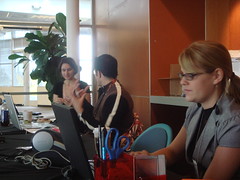 | 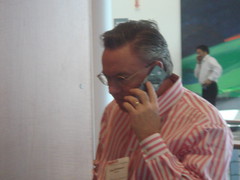 |
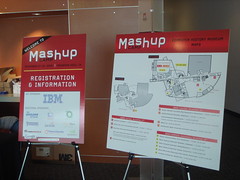 | 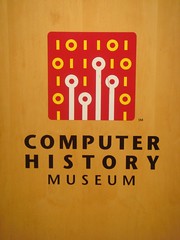 |
Click here to see all of my pics from the conference.
[this was the last in a three part series about MashupCamp, fall 2008]
Labels:
david berlind,
DistroMash,
MashupCamp,
MashupCamp2008,
RadWebTech,
Tim O'Reilly
MashupCamp: DAY TWO
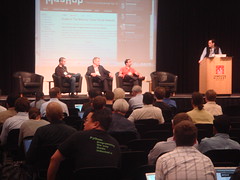 The second day of MashupCamp picked up where the previous day left off. Dave brought everyone up-to-date with the plans for the day and then the general assembly morphed into the first panel discussion: “Making the Case for Mashups in Business.”
The second day of MashupCamp picked up where the previous day left off. Dave brought everyone up-to-date with the plans for the day and then the general assembly morphed into the first panel discussion: “Making the Case for Mashups in Business.”Discussion panels are new to the MashupCamp agenda and are a welcome addition. They balance the “un-conference” nature of the program and provide a good transition between the various parts.
John Musser of Programmable Web, author and technologist Dan Woods, and security guru Hart Rossman brought their considerable experience together for the mashups in business discussion.
 Following the always informative sometimes intense conversation, the conference moved into the un-conference portion of the agenda: scheduling for the unscheduled discussions. A huge grid was placed on the wall of the auditorium with meeting rooms listed across the top and time slots down the side. Anyone that wanted to could suggest a discussion topic, announce it, write it out landscape-style on a piece of paper, and tape it to an available slot.
Following the always informative sometimes intense conversation, the conference moved into the un-conference portion of the agenda: scheduling for the unscheduled discussions. A huge grid was placed on the wall of the auditorium with meeting rooms listed across the top and time slots down the side. Anyone that wanted to could suggest a discussion topic, announce it, write it out landscape-style on a piece of paper, and tape it to an available slot. The un-conference concept is dynamically generated crowd-conferencing where every individual voice has the opportunity to be heard. And if you find yourself sitting in a discussion that fails to hold your interest, you are encouraged to vote with your two feet – right out the door and into another, hopefully more engaging, conversation.
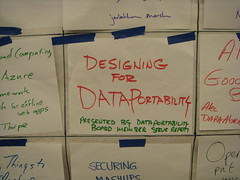 The session I hosted was entitled “Designing for DataPortability.” As you may know, I sit on the board of the International DataPortability organization. I was fortunate that three other members of the twelve person world-wide board also joined me, including the chairwoman of the organization.
The session I hosted was entitled “Designing for DataPortability.” As you may know, I sit on the board of the International DataPortability organization. I was fortunate that three other members of the twelve person world-wide board also joined me, including the chairwoman of the organization.There are lots of great things happening in the world of data portability and in particular with the DataPortability organization. The conversation was brisk, intense, and spanned many aspects of the current and envisioned state of data portability.
Following five hours of un-conference discussions, Dave held a wrap up followed by a mandatory meeting for “Best Mashup” competitors. The latter prepared the contestants for the day to follow where they and their creations would be the stars of the show, and one would be crowned king (or queen).
 The second day of the conference officially ended around 6pm, however many eager (and harried) contest entrants were huddled in corners, strewn around the various tables of the main hall, or hunkered down in the conference-provided “hacker’s den.” This went on for some time into the evening as they all endeavored to create the next great award-winning mashup for fame, glory, bragging rights -- and cool prizes!
The second day of the conference officially ended around 6pm, however many eager (and harried) contest entrants were huddled in corners, strewn around the various tables of the main hall, or hunkered down in the conference-provided “hacker’s den.” This went on for some time into the evening as they all endeavored to create the next great award-winning mashup for fame, glory, bragging rights -- and cool prizes![This is the second party of a three part article]
Friday, November 21, 2008
Report from the trenches: MashupCamp, fall 2008: DAY ONE
Just back from MashupCamp in Mountain View CA where I was surrounded by three days of geek nirvana.
 MashupCamp is an “un-conference” that this year introduced elements of measured structure into a program that continues to grow and mature into the coolest event surrounding the mashup phenomenon.
MashupCamp is an “un-conference” that this year introduced elements of measured structure into a program that continues to grow and mature into the coolest event surrounding the mashup phenomenon.
Sponsored by media giant TechWeb, and led by the uber-media guru David Berlind, this year’s event was by far the biggest and best so far (and that’s saying a lot considering the success of the prior conferences!). There were a number of subtle tweaks to the program that cumulatively added to the experience.
The three day geek-fest started with the traditional opening by Dave followed by an introduction to the sponsors and service providers via the much vaunted speed-geeking sessions.
As Dave describes it, speed-geeking is the technology equivalent of speed dating: in this case, thirteen high-top tables featuring a like number of presentations with audience participants assigned to one of the tables to start. After an initial blast of the horn (more like a woo-woo sound), presenters have eight minutes to blow the socks off the crowd gathered around their area. Another woo-woo later, and, like musical chairs, the crowd rotates to the next station until all stations have been visited.
Speed-geeking is an assault on the senses brought forth by presenters and cherished by participants. It is a terrific high-speed fast-talking screen-flickering introduction to (mostly) killer products and technologies. Like falling down the techno-rabbit hole with a bungee cord attached – and an 8-minute return trajectory.
Some of the highlights of the solutions provider speed-geeking included:
Calais, http://www.opencalais.com
In a world of interconnections, Open Calais provides a cool way to generate relations, links, and other meta-tag information automatically from text, feeds, and other web content. This is a very ambitious undertaking and works wonderfully, though my observation is larger conversions are better handled as pre-processed components rather than real-time conversions (due to the time required to execute the conversion). Nevertheless, VERY COOL.
Mozenda, http://www.mozenda.com
These guys provide back-end functionality accessible via web services that allow users to “easily extract, repurpose, and publish web data.” A number of entrants in the mashup contest (held on day three of Mashup camp) used Mozenda for back-end interaction. Again, VERY COOL.
WetPaint, http://www.wetpaintinjected.com
Adding embedded wikis with off-site storage is trivially easy with WetPaint Injected. Many of the mashup contestants used this functionality in their contest entries, and it made traditionally static content dynamic and interactive.
Zembly, http://www.zembly.com
Helping you create apps that work in Facebook, Meebo, OpenSocial and more is these guys’ forte. They even provide application hosting options.
There were lots of other cool products and technologies demonstrated by the sponsors and solutions providers, including: IBM, AOL Developer Network, Elfenworks Foundation (they weren’t really a provider, but as a sponsor they represented a great cause and inspired a bunch of awesome mashup contest entries), Google, JackBe, OpenAjax, RadWebTech (editor disclosure: this is my company and publisher/creator of DistroMash, Scrapplet, xWinLib, and more), The Web Service, and even Yahoo.
One of the coolest things I saw at MashupCamp was from IBM, yup the big blue one! IBM is part of the OpenAjax alliance and co-hosted the first-day cocktail party. There they demonstrated an awesome variation on using the web collaboratively with independent synchronization across multiple browsers including hi-res video, audio, and event sharing (keyboard, mouse, and programmatic integration). This goes way beyond screen or whiteboard sharing and truly makes the web collaborative.
Since RadWebTech was also one of the co-sponsors of the MashupCamp event, I too was a speed-geeking presenter showing off our latest products and technology, including DistroMash, xWinLib, and Scrapplet. It was a GREAT conference for us (more on that later), and I can say with some authority that the best thing for a strained voice (inflicted from and hour and a half of frantic speed-geeking) is Sam Adams!
[This is part one of a three part series. Stay tuned for more]
 MashupCamp is an “un-conference” that this year introduced elements of measured structure into a program that continues to grow and mature into the coolest event surrounding the mashup phenomenon.
MashupCamp is an “un-conference” that this year introduced elements of measured structure into a program that continues to grow and mature into the coolest event surrounding the mashup phenomenon. Sponsored by media giant TechWeb, and led by the uber-media guru David Berlind, this year’s event was by far the biggest and best so far (and that’s saying a lot considering the success of the prior conferences!). There were a number of subtle tweaks to the program that cumulatively added to the experience.
The three day geek-fest started with the traditional opening by Dave followed by an introduction to the sponsors and service providers via the much vaunted speed-geeking sessions.
As Dave describes it, speed-geeking is the technology equivalent of speed dating: in this case, thirteen high-top tables featuring a like number of presentations with audience participants assigned to one of the tables to start. After an initial blast of the horn (more like a woo-woo sound), presenters have eight minutes to blow the socks off the crowd gathered around their area. Another woo-woo later, and, like musical chairs, the crowd rotates to the next station until all stations have been visited.
Speed-geeking is an assault on the senses brought forth by presenters and cherished by participants. It is a terrific high-speed fast-talking screen-flickering introduction to (mostly) killer products and technologies. Like falling down the techno-rabbit hole with a bungee cord attached – and an 8-minute return trajectory.
Some of the highlights of the solutions provider speed-geeking included:
Calais, http://www.opencalais.com
In a world of interconnections, Open Calais provides a cool way to generate relations, links, and other meta-tag information automatically from text, feeds, and other web content. This is a very ambitious undertaking and works wonderfully, though my observation is larger conversions are better handled as pre-processed components rather than real-time conversions (due to the time required to execute the conversion). Nevertheless, VERY COOL.
Mozenda, http://www.mozenda.com
These guys provide back-end functionality accessible via web services that allow users to “easily extract, repurpose, and publish web data.” A number of entrants in the mashup contest (held on day three of Mashup camp) used Mozenda for back-end interaction. Again, VERY COOL.
WetPaint, http://www.wetpaintinjected.com
Adding embedded wikis with off-site storage is trivially easy with WetPaint Injected. Many of the mashup contestants used this functionality in their contest entries, and it made traditionally static content dynamic and interactive.
Zembly, http://www.zembly.com
Helping you create apps that work in Facebook, Meebo, OpenSocial and more is these guys’ forte. They even provide application hosting options.
There were lots of other cool products and technologies demonstrated by the sponsors and solutions providers, including: IBM, AOL Developer Network, Elfenworks Foundation (they weren’t really a provider, but as a sponsor they represented a great cause and inspired a bunch of awesome mashup contest entries), Google, JackBe, OpenAjax, RadWebTech (editor disclosure: this is my company and publisher/creator of DistroMash, Scrapplet, xWinLib, and more), The Web Service, and even Yahoo.
One of the coolest things I saw at MashupCamp was from IBM, yup the big blue one! IBM is part of the OpenAjax alliance and co-hosted the first-day cocktail party. There they demonstrated an awesome variation on using the web collaboratively with independent synchronization across multiple browsers including hi-res video, audio, and event sharing (keyboard, mouse, and programmatic integration). This goes way beyond screen or whiteboard sharing and truly makes the web collaborative.
Since RadWebTech was also one of the co-sponsors of the MashupCamp event, I too was a speed-geeking presenter showing off our latest products and technology, including DistroMash, xWinLib, and Scrapplet. It was a GREAT conference for us (more on that later), and I can say with some authority that the best thing for a strained voice (inflicted from and hour and a half of frantic speed-geeking) is Sam Adams!
[This is part one of a three part series. Stay tuned for more]
Labels:
DistroMash,
MashupCamp,
MashupCamp2008,
scrapplet,
xwinlib
Tuesday, November 18, 2008
MashupCamp 2008
Yesterday, we introduced DistroMash to the mashup community here in Mountain View, CA at the MashupCamp 2008 conference put on by David Berlind & company. It's a great feeling to get the kind of positive response that we did from developers and other industry insiders.
DistroMash uses RadWebTech's browser-based windowing and container technology (xWinLib and WebCapsulate) and combines them using Scrapplet as the presentation layer and administration console.
After 5 speed-geeking sessions, multiple chalk talks, and conversations with hundreds of techies, my voice has almost recovered -- just in time for a presentation today about DataPortability and more cool RadWebTech technology!
Kudos to Dave, Greg, Angela, and Elizabeth (along with parent company TechWeb) for a job well done...and, two more days still to go! Stay tuned!!!
See all the goings on at the MashupCamp website.
(The only thing missing from all of this is my wife, who was unable to attend this time [bummer, miss you!])
DistroMash uses RadWebTech's browser-based windowing and container technology (xWinLib and WebCapsulate) and combines them using Scrapplet as the presentation layer and administration console.
After 5 speed-geeking sessions, multiple chalk talks, and conversations with hundreds of techies, my voice has almost recovered -- just in time for a presentation today about DataPortability and more cool RadWebTech technology!
Kudos to Dave, Greg, Angela, and Elizabeth (along with parent company TechWeb) for a job well done...and, two more days still to go! Stay tuned!!!
See all the goings on at the MashupCamp website.
(The only thing missing from all of this is my wife, who was unable to attend this time [bummer, miss you!])
Labels:
chalk talk,
DistroMash,
MashupCamp,
MashupCamp2008,
scrapplet,
speed geeking,
WebCapsulate,
xwinlib
Tuesday, November 11, 2008
JS-Kit, DataPortability, and Commenting
I recently responded to an excellent post by Chris Saad (a fellow board member of the DataPortability Organization). He basically layed out scenarious for hosting, posting, and monitoring comments posted to websites.
His full post is at: Rich , Interactive Features for your siteFinding balance in the force
My response:
The rights conveyed depend on the context. If I agree to post to a public forum, then I should be aware that my comments may be copied and propagated all over the place – and there’s not much anyone can do about it. I’m ok with this because I knew going in that is was a public forum. You, the site owner, do not have the right to modify my content unless I say you can. You do have the right to delete it in its entirety (revoking the invitation to post in the first place).
On the other hand, if I post something when you tell me that the venue is non-public or limited in scope, then I have every expectation that you will honor that representation. But you still can’t change my stuff unless I specifically grant you permission (BTW, you may get that permission as part of the TOS provided before I post).
An important variant on this theme is related to mature and potentially objectionable content – again dictated by context. There is no world-wide sensor (thankfully) and there is no clear standard for mature or objectionable content. Once again, relationship must be dictated by conveyance, that is: you get to post on my site provided you agree to a, b, and c. And, you can be comfortable in posting on my site because I represent back to to you x, y, and z.
From a technology implementation standpoint (and I am quite familiar with JS-Kit’s awesome products, having dealt with them previously through Zude), the real challenge/opportunity is all about the flexibility of dealing with all of these scenarios without encumbering the product or confusing the user.
Steve Repetti
RadWebTech.com
His full post is at: Rich , Interactive Features for your siteFinding balance in the force
My response:
The rights conveyed depend on the context. If I agree to post to a public forum, then I should be aware that my comments may be copied and propagated all over the place – and there’s not much anyone can do about it. I’m ok with this because I knew going in that is was a public forum. You, the site owner, do not have the right to modify my content unless I say you can. You do have the right to delete it in its entirety (revoking the invitation to post in the first place).
On the other hand, if I post something when you tell me that the venue is non-public or limited in scope, then I have every expectation that you will honor that representation. But you still can’t change my stuff unless I specifically grant you permission (BTW, you may get that permission as part of the TOS provided before I post).
An important variant on this theme is related to mature and potentially objectionable content – again dictated by context. There is no world-wide sensor (thankfully) and there is no clear standard for mature or objectionable content. Once again, relationship must be dictated by conveyance, that is: you get to post on my site provided you agree to a, b, and c. And, you can be comfortable in posting on my site because I represent back to to you x, y, and z.
From a technology implementation standpoint (and I am quite familiar with JS-Kit’s awesome products, having dealt with them previously through Zude), the real challenge/opportunity is all about the flexibility of dealing with all of these scenarios without encumbering the product or confusing the user.
Steve Repetti
RadWebTech.com
Labels:
Chris Saad,
Data Portability,
DataPortability,
Js-Kit
Subscribe to:
Posts (Atom)
